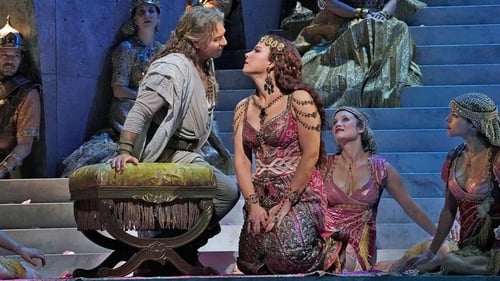
Writer
Возвышающийся библейский эпос, оперный взгляд Сен-Санса на историю Самсона и Далилы, обладает многими отличительными чертами большой оперы - захватывающими дух вокальными данными, захватывающими припевами и захватывающим сюжетом на обширном псевдоисторическом фоне. Вполне уместно, что «Самсон и Далила» были выбраны для празднования открытия сезона Метрополитена четыре раза в истории компании, в том числе когда премьера смелого нового спектакля Дарко Тресняка состоялась в первый вечер сезона 2018–2019. Несколько недель спустя опера была показана в рамках серии прямых кинотрансляций Метрополитена с участием исключительного состава. Тенор Роберто Аланья был героическим Самсоном, который в конце концов стал жертвой обольстительной силы Далилы - пленительной меццо-сопрано Элины Гаранчи. Бас-баритон Лоран Наури спел зловещую песню верховного жреца Дагона, а дирижер сэр Марк Элдер стоял на подиуме.

Screenplay
Lightning streaks through the skies as Dalila declares her love to Samson in one of the finest arias of romantic opera. “My heart awakens to your voice like a flower to the kiss of dawn.” An enchanting yet treacherous beauty… When the thunder at last rumbles, Dalila betrays Samson and offers him up to his enemies: “Come up, for this time he has shown me all his heart”, she whispers to them in the night (The Old Testament, Book of Judges). Based on a violent and erotic biblical story, Saint-Saëns’s opera – composed in 1877, much to Liszt’s insistence – would not be performed at the Palais Garnier until fifteen years later. This first Parisian performance in 1892 included the hitherto unperformed “Dance Of The Priestesses”. Nevertheless, it became one of the most performed French operas in the world, together with Faust and Carmen. Conducted by Philippe Jordan, this new production brings back a repertoire masterpiece that has not been performed at the Paris Opera for twenty-five years.

Screenplay
The opera is based on the Biblical tale of Samson and Delilah found in Chapter 16 of the Book of Judges in the Old Testament. It is the only opera by Saint-Saëns that is regularly performed. The second act love scene in Delilah's tent is one of the set pieces that define French opera. Two of Delilah's arias are particularly well known: "Printemps qui commence" and "Mon cœur s'ouvre à ta voix", the latter of which is one of the most popular recital pieces in the mezzo-soprano/contralto repertoire. Staged by greek director Yannis Kokkos and conducted by Valery Gergiev on May 25th, 2016 at the Mariinsky Theatre.

Writer
While the rest of the Hebrews bewail their fate, Samson alone trusts in God's promise of liberty. Abimelech, the Philistine satrap of Gaza, enters to mock the Hebrews' God, proclaiming the superiority of Dagon, and the Hebrews are afraid of him. But calls them to show some defiance, so Abimelech attacks Samson with his sword. Samson seizes the sword and strikes him dead. The Hebrews scatter and the High Priest of Dagon appears, cursing the Hebrews. When a messenger reports that the Hebrews are ravaging the harvest, the High Priest forms a plan to use Delilah to overcome Samson's strength. Delilah's beauty is such that Samson can't resist her for long. She begs to know the secret of his supernatural strength, but he refuses, though he says he loves her. Delilah betrays Samson by having some Philistine soldiers seize him and throw him into a prison in Gaza, where his hair is cut off.



